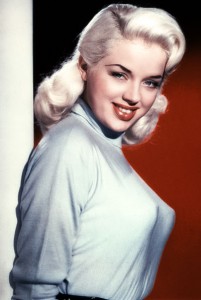Christopher Stocks
Journalism
- Madresfield | House & Garden
- Winfield House | Gardens Illustrated
- Naming of Names | Independent on Sunday
- Tessa Kennedy | House & Garden
- USCS | Abercrombie & Fitch Magazine
- Armageddon Calling | Wallpaper
- Beverley Nichols | Gardens Illustrated
- Deep in the Forest | Tank
- Dorset | Daily Telegraph
- Peyton Skipwith | B.B,Esquire
- Seeds | Patek Philippe
- Tenants of the National Trust | NT Magazine
- Emeco | Broom chair
- Flucked | Empire
- Space Oddity | The Face
- Cleopatra | Harpers
- Pebbles | Things magazine
Flucked | Empire
 Diana Fluck was born on 23 October 1931 and died, better known by then as Diana Dors, on 4 May 1984. Fluck may hardly be a name to conjure with – OK, OK, all too tempting to conjure with – but then ludicrous real names never stopped Frances Gumm, Maurice Micklewhite and Archie Leach from rocketing to superstardom. Nor did coming from the wrong side of the tracks… even when there were as many tracks as there were in Diana’s home town of Swindon (and there were lots).
Diana Fluck was born on 23 October 1931 and died, better known by then as Diana Dors, on 4 May 1984. Fluck may hardly be a name to conjure with – OK, OK, all too tempting to conjure with – but then ludicrous real names never stopped Frances Gumm, Maurice Micklewhite and Archie Leach from rocketing to superstardom. Nor did coming from the wrong side of the tracks… even when there were as many tracks as there were in Diana’s home town of Swindon (and there were lots).
But while Judy Garland, Michael Caine, Cary Grant et al shot into the stratosphere and entered movie history, dear Diana Dors, with her doomed marriages and disastrous affairs, never quite attained escape velocity, remaining to the end, for all her brassy charm, a big fat Fluck with a filmography that sounds about as thrilling as a Sunday in Swindon: Adventures of a Taxi Driver, Theatre of Blood, Steptoe and Son Ride Again, Keep it Up Downstairs and, of course, 1967’s incomparable Berserk! with a 63-year-old Joan Collins (the former Lucille LeSeuer) as a circus ringmaster lit like an overcooked member of the Addams family.
The tragic thing about this book is not Diana’s life – though God knows it makes pretty depressing reading – as much as the trashy way it’s written, as if Dors (and by implication her fans) deserves no better; lazily penned, not to mention catatonically edited, Come by Sunday does little more than illustrate Premiere’s First Law of Movie Biographies, which, as you’ll no doubt remember, states that the quality of any given work is in directly inverse proportion to the length of its title.
Admittedly there are touches of heart-rending pathos – ‘As a little girl she’d laid a note inside the top of the dustbin saying who she was, where she lived, that she could sing, dance and act, and could anyone out there help her break into the film business?’ – but what one is left with is the queasy feeling of having spent too long with the kind of ghastly semi-celebrities who used to loom, gurning and capering about in desperate bids for attention, out of the subaqueous murk of 1970s television.
Perhaps the record producer Simon Napier-Bell best (if, one suspects, inadvertently) summed her up when he said, ‘Diana is a superstar, but for some reason she has not been doing superstar things.’ How true, how very true.
(Review of Come by Sunday: The Fabulous, Ruined Life of Diana Dors, by Damon Wise)